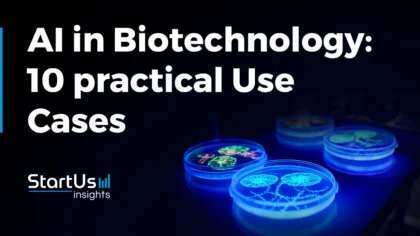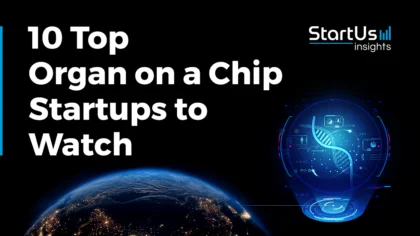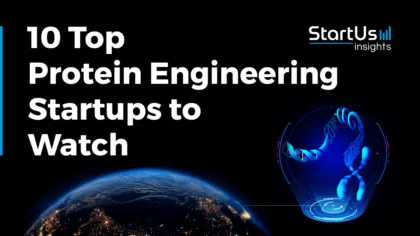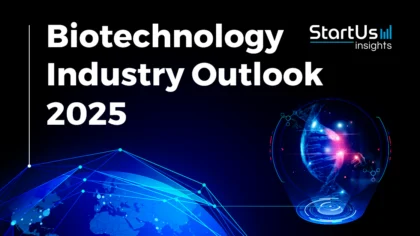Accelerate Productivity in 2025
Reignite Growth Despite the Global Slowdown
Integration of artificial intelligence (AI) in biotechnology addresses challenges like high R&D costs, supply chain constraints, and data management and unlocks new possibilities. In drug discovery, AI-powered platforms like Cancerappy analyze vast databases of compounds to accelerate the identification of potential oncological targets and improve lead candidates. Such data-driven approaches reduce the time and cost associated with early-stage drug development.
The application of AI across domains, including precision agriculture, protein engineering, and genome sequencing, increases research methodologies and product development pipelines. As the applications of AI in the biotechnology industry continue to evolve, stakeholders must integrate these emerging innovations into their operations to optimize research capabilities, improve data-driven decision-making, and address the increasing demand for personalized medicine.
Why should you read this report?
- Gain insights into the top 10 applications of AI in biotechnology.
- Learn about three practical use cases for each application.
- Meet 10 innovative startups advancing these applications.
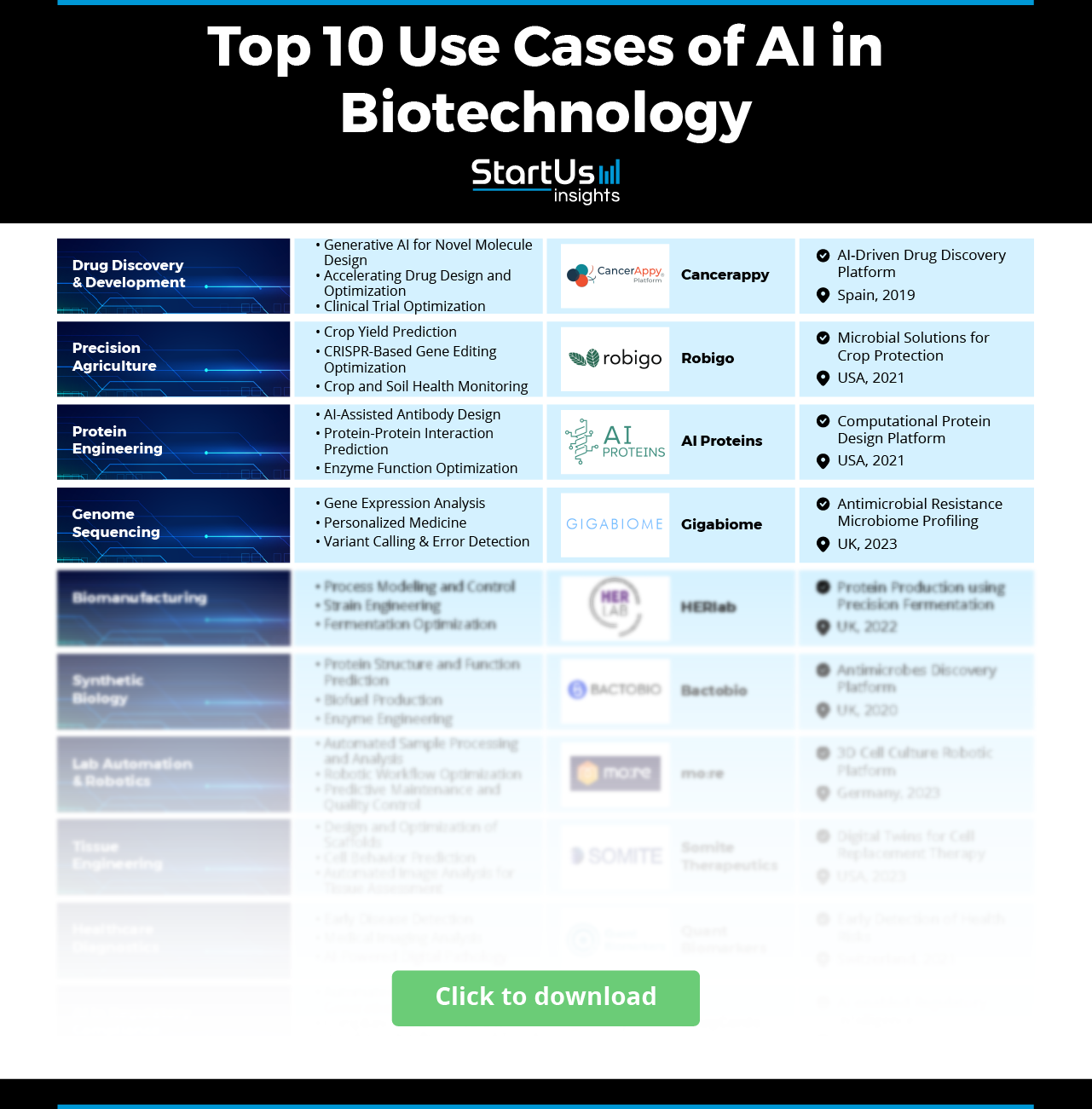
FAQs: Applications of AI in Biotechnology
How is AI used in biotechnology?
Artificial intelligence (AI) aligns data analysis and accelerates discovery processes in biotechnology. It identifies patterns within large datasets, enabling researchers to better understand gene sequences, protein structures, and biological pathways. In drug discovery, AI expedites lead identification by predicting compound efficacy and toxicity and reduces the time spent on traditional trial-and-error methods.
Additionally, AI plays a key role in precision medicine, where it tailors treatments to individual patients by analyzing genetic and clinical data for personalized therapies. AI algorithms also improve laboratory automation, optimizing workflows, and improving experimental accuracy.
What is the future of AI in biotechnology?
AI will likely drive more efficient biotechnology solutions, particularly in areas like synthetic biology and gene editing. As AI models evolve, they will handle increasingly complex datasets, enabling more precise simulations and predictions in drug design and protein engineering.
AI’s integration with biotechnology will also lead to faster and more scalable production of biologics. It will also improve the bioinformatics tools used to analyze genetic information. In healthcare, AI-driven developments will enable better diagnostics, early disease detection, and individualized treatment plans, aligning with the trend toward personalized medicine.
Key Takeaways
- Drug Discovery and Development
- Use Cases:
- Generative AI for Novel Molecule Design
- Accelerating Drug Design and Optimization
- Clinical Trial Optimization
- Startup to Watch: Cancerappy
- Use Cases:
- Precision Agriculture
- Use Cases:
- Crop Yield Prediction
- CRISPR-Based Gene Editing Optimization
- Crop and Soil Health Monitoring
- Startup to Watch: Robigo
- Use Cases:
- Protein Engineering
- Use Cases:
- AI-Assisted Antibody Design
- Protein-Protein Interaction Prediction
- Enzyme Function Optimization
- Startup to Watch: AI Proteins
- Use Cases:
- Genome Sequencing
- Use Cases:
- Gene Expression Analysis
- Personalized Medicine
- Variant Calling and Error Detection
- Startup to Watch: GigaBiome
- Use Cases:
- Biomanufacturing
- Use Cases:
- Process Modeling and Control
- Strain Engineering
- Fermentation Optimization
- Startup to Watch: HERlab
- Use Cases:
- Synthetic Biology
- Use Cases:
- Protein Structure and Function Prediction
- Biofuel Production
- Enzyme Engineering
- Startup to Watch: Bactobio
- Use Cases:
- Lab Automation and Robotics
- Use Cases:
- Automated Sample Processing and Analysis
- Robotic Workflow Optimization
- Predictive Maintenance and Quality Control
- Startup to Watch: mo:re
- Use Cases:
- Tissue engineering
- Use Cases:
- Design and Optimization of Scaffolds
- Cell Behavior Prediction
- Automated Image Analysis for Tissue Assessment
- Startup to Watch: Somite Therapeutics
- Use Cases:
- Healthcare Diagnostics
- Use Cases:
- Early Disease Detection
- Medical Imaging Analysis
- AI-Powered Digital Pathology
- Startup to Watch: Quant Biomarkers
- Use Cases:
- AI in Regulatory Complian3ce
- Use Cases:
- Automated Regulatory Document Generation
- Compliance Risk Assessment
- Regulatory Intelligence and Trend Analysis
- Startup to Watch: DrugCards
- Use Cases:
Top 10 Applications of AI in Biotechnology [2025 & Beyond]
1. Drug Discovery and Development
Artificial intelligence enables the identification of promising drug candidates through the data-driven study of chemical interactions, and biological data. Machine Learning models forecast the way compounds will interact with targets and reduce the time needed for lead optimization. Molecular simulations powered by AI further reduce the need for physical testing while predictive algorithms determine drug properties like toxicity, bioactivity, and behavior in clinical trials.
3 Specific Use Cases of AI in Drug Discovery & Development
- Generative AI for Novel Molecule Design: Generative AI utilizes neural networks and deep learning to optimize new molecular structures with desired properties. These molecular structures optimize specific biological targets.
- Accelerating Drug Design and Optimization: Deep learning accelerates drug discovery by minimizing trial and error. This reduces development timelines and enables the prediction of molecular interactions.
- Clinical Trial Optimization: Machine Learning algorithms analyze vast datasets from electronic medical records (EMRs) to identify candidates for clinical trials and predict patient outcomes while reducing the need for subjective human assessment.
Startup to Watch: Cancerappy
Spanish startup Cancerappy develops an AI-driven platform to accelerate oncological targets and drug discovery. The company’s platform analyzes extensive databases that contain 1 billion compounds as drug candidates. Machine learning algorithms integrated into the platform perform lead optimization calculations based on factors like biological activity, target specificity, and ADMET properties. Potential drug candidates then move to the preclinical development stage where in-vitro testing, validation of computational results, biochemical assays, and cellular assays take place.
2. Precision Agriculture
Precision farming enables targeted resource management and improves crop production methods. Using neural networks, pest and disease detection systems protect crops and reduce pesticide use. Additionally, smart irrigation systems optimize water distribution based on real-time soil health data and deliver nutrients. This practice of integrating AI in agricultural biotechnology boosts crop yield and improves soil health.
3 Specific Use Cases of AI in Precision Agriculture
- Crop Yield Prediction: AI analyzes weather patterns and soil health data from sensors for crop yield prediction. This allows farmers to optimize resource allocation.
- CRISPR-Based Gene Editing Optimization: Deep learning algorithms enable optimal guide RNAs for specific target sequences and reduce the risk of unintended mutations by improving off-target effect prediction.
- Crop & Soil Health Monitoring: Machine learning models assess soil health, moisture levels, and temperature variations to identify potential crop issues.
Startup to Watch: Robigo
US-based startup Robigo leverages artificial intelligence and microbial engineering to improve plant health and increase crop yields. It engineers microbes to create crop protectants that are environment-friendly and promote effective crop yields. The protectants target specific bacteria and eliminate only the harmful ones, unlike pesticides which attack beneficial organisms as well. Also, this biopesticide promotes soil health and increases crop productivity while reducing chemical use, contributing to sustainable agriculture.
3. Protein Engineering
Predicting protein structures and folding patterns allows researchers to identify functional proteins. Utilizing deep learning, neural networks foster new protein designs with better functionalities. For example, generative AI models produce millions of protein variants with tailored properties. Additionally, they analyze protein variations across different organisms to reduce drug development costs and time.
3 Specific Use Cases of AI in Protein Engineering
- AI-Assisted Antibody Design: Predictive modeling and deep learning algorithms analyze large datasets of molecular structures and binding properties to predict optimal antibody sequences. This reduces the need for laboratory testing.
- Protein-Protein Interaction Prediction (PPI): Machine learning models aid in protein-protein interaction prediction by extracting complex patterns from high-dimensional data.
- Enzyme Function Optimization: AI models identify patterns in enzyme-substrate interactions and predict mutations. This approach improves catalytic efficiency and stability of enzyme behavior under various conditions.
Startup to Watch: AI Proteins
US-based startup AI proteins provide drug-like miniproteins combining artificial intelligence and synthetic biology. The company’s platform begins protein production with de novo design of miniprotein binders which gives control over its structure. These genetically encodable miniproteins are subjected to yeast/phage display to screen libraries. The next step includes high-throughput biophysical characterization using techniques like circular dichroism spectroscopy for structural stability and surface plasmon resonance for binding affinity. The platform engineers miniproteins and makes it ready for preclinical development in 3 to 12 weeks.
4. Genome Sequencing
Neural networks and deep learning algorithms improve genome sequencing by reducing the time and cost required to identify complex patterns and structures within DNA sequences. AI-enabled platforms predict how genetic variations affect RNA splicing. This allows researchers to develop precise targets in therapeutics and other applications. Additionally, recurrent neural networks (RNNs) and convolutional neural networks (CNNs) interpret image and signal data generated by sequencing instruments to acc.
3 Specific Use Cases of AI in Genome Sequencing
- Gene Expression Analysis: AI algorithms identify correlations and patterns in large datasets to discover biomarkers and genetic variations associated with diseases. This increases the accuracy, speed, and depth of data interpretation.
- Personalized Medicine: Integration of various data sources enables healthcare providers to identify optimal treatment plans and predict disease progression. It matches patient records to clinical trials based on genetic profiles which accelerates new personalized treatments.
- Variant Calling & Error Detection: Identifying changes in a DNA sequence such as insertions, deletions, and mutations is improved by AI algorithms. They reduce false positives and detect sequencing errors from reference genomes.
Startup to Watch: Gigabiome
UK-based startup Gigabiome offers microbiome solutions by leveraging artificial intelligence and bioinformatics. The company builds tools and devices that assist clinicians to identify antimicrobial resistance and prescribe correct antimicrobials. The company’s quantification pipeline platform analyzes antimicrobial resistance from stool to saliva samples and characterizes resistance on a personalized level. Its other platform offers pan-metagenomics resources with quantification of resistance genes across several diseases and countries from gut and oral microbiome data. Utilizing AI, the company designs small molecules and stops the spread of disease.
5. Biomanufacturing
Machine learning and deep learning models reduce production times and costs by optimizing the design of cell cultures and media for better yield and efficiency. Artificial metabolic networks facilitate the modeling of complex biological systems to predict and optimize metabolic pathways. Additionally, AI-based predictive maintenance systems in biomanufacturing analyze sensor data to forecast equipment failures and offer continuous production.
3 Specific Use Cases of AI in Biomanufacturing
- Process Modeling and Control: Digital twins visualize processes to optimize operations and mitigate risks. This enables the production of proteins or antibodies that require precise control over parameters like pH, temperature, and nutrient levels.
- Strain Engineering: In biomanufacturing applications, AI improves the development of microbial strains and accelerates the process of genetic modification. It also allows accurate predictions of strain behavior in real-world environments through simulations.
- Fermentation Optimization: AI aligns fermentation by analyzing past fermentation data and identifying trends. In this approach, parameters like aeration time and nutrient feeds are adjusted in real time.
Startup to Watch: HERlab
UK-based startup HERlab develops a platform that optimizes micro-organisms for scalable precision fermentation. The platform combines synthetic biology and AI to identify yeast strains for bio-manufacturing processes. This optimizes non-conventional yeast hosts and accelerates the discovery of new microorganisms and fermentation processes for industrial usage.
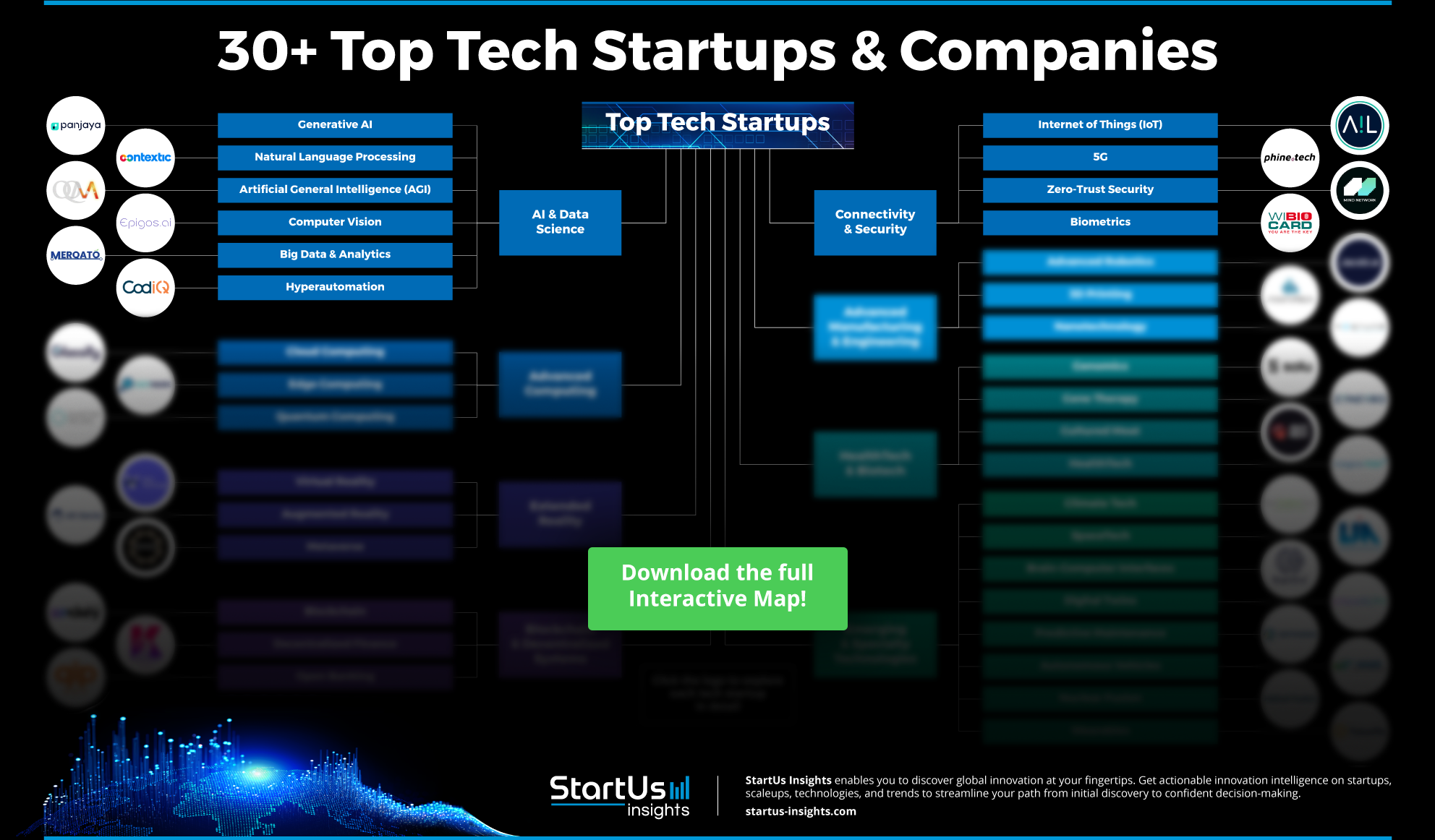
6. Synthetic Biology
The integration of AI in synthetic biology systems enables novel biological parts and systems. AI models simulate complex interactions between genes to produce more efficient synthetic microorganisms. By optimizing genetic circuits that mimic natural processes, these AI models enable biological systems for biosensing, drug delivery, and more. AI-driven biosensors find applications in rapid diagnostics, environmental sensing, and continuous health monitoring. Additionally, AI facilitates self-driving labs which automates experimental setups and makes informed choices.
3 Specific Use Cases of AI in Synthetic Biology
- Protein Structure & Function Prediction: Deep learning models enable accurate modeling of complex proteins which analyzes vast protein sequence data. This approach enables the design of new proteins and predicts how they fold or interact with enzymes and antibodies.
- Biofuel Production: AI improves metabolic engineering, predictive modeling, and automated experiments for biofuel production. They design synthetic systems as well as perform genomic analysis of high-yield crops such as corn, sugarcane, and soya beans.
- Enzyme Engineering: By enabling data-driven design workflows, AI enables researchers to discover new enzyme structures and amino acid modifications. It also facilitates virtual screening and predicts enzyme behavior by varying environmental conditions.
Startup to Watch: Bacto Bio
UK-based startup Bacto Bio combines synthetic biology, DNA sequencing, bioinformatics, and artificial intelligence to culture novel microbes. The company’s microbial generation platform uses next-generation sequencing (NGS) to understand which microbes grow together. It also understands how microbial communities grow and uses synthetic biology to isolate and grow new microbes in the laboratory. This enables biotech companies to better understand the commercial potential of microbes and create antimicrobial solutions.
7. Lab Automation and Robotics
Automating lab operations leads to increased efficiency and accuracy. AI algorithms employ iterative screening methods while machine learning models identify promising compounds from vast datasets. Robotic assistants driven by artificial intelligence further perform complex tasks such as liquid handling and sample preparation. They monitor equipment performance in labs, schedule maintenance, and save time. Additionally, lab automation solutions monitor experiments in real-time to identify anomalies or deviations.
3 Specific Use Cases of AI in Lab Automation & Robotics
- Automated Sample Processing & Analysis: AI-driven robots perform precise and consistent sample transfers which reduce manual errors. This integration of AI streamlines laboratory workflows interprets results, and improves the overall quality of sample processing.
- Robotic Workflow Optimization: Intelligent robots manage repetitive tasks such as sample processing, liquid handling, and experiment scheduling. Machine learning models further optimize outcomes and minimize resource completion.
- Predictive Maintenance & Quality Control: AI algorithms analyze vast datasets from the past to predict failures and optimize maintenance schedules. They examine sensor data and predict equipment failure to reduce downtime and maintenance costs.
Startup to Watch: mo:re
German startup mo:re minimizes manual tasks in 3D cell culture with its robotic and software platform to automate cell therapies. This solution eliminates animal testing, acts as a co-pilot during the research, and reduces the cost of cell therapy. For long-term research, the platform offers high reproducibility and traceability by integrating robotics and artificial intelligence to handle tasks like cell cultivation, monitoring, and analysis. This approach supports drug screening, disease modeling, and cell-to-cell interaction by accelerating quality control.
8. Tissue Engineering
Researchers leverage AI in tissue engineering workflows to create optimal structure and composition for tissue growth. Machine learning and deep learning models improve the selection of biomaterial and organoid development to increase tissue integration and cellular responses. AI models simulate the behavior of biological systems in controlled environments. Moreover, the integration of AI into the workflow facilitates biomaterial design by predicting biological interactions of materials and specific tissue types.
3 Specific Use Cases of AI in Tissue Engineering
- Design and Optimization of Scaffolds: 3D convolutional neural networks (CNNs) analyze large datasets for bioactive ligand selection. This optimizes biomaterial design and improves scaffold performance.
- Cell Behavior Prediction: AI predicts cell reactions to different biomaterial features and external stimuli. AI models process complex data from cell proliferation, differentiation, and migration to predict cellular responses.
- Automated Image Analysis for Tissue Assessment: This technique enables real-time examination of tissue samples and analyzes imaging data such as histological or microscopic images. Deep learning models then classify tissue types and tumor grades to predict patient survival.
Startup to Watch: Somite Therapeutics
US-based startup Somite Therapeutics provides an AI-driven cell therapy. It improves the generation of new cell types by developing a digital twin of the embryo to identify protocols for generating new cell types and carry out rapid optimization cycles. It simulates the real embryo’s development and provides better decision-making. The company’s solution adapts to treat diseases like muscular dystrophy, diabetes, and obesity.
9. Healthcare Diagnostics
Machine learning algorithms predict complex biomarker patterns to improve early detection of diseases. AI solutions analyze patient data from various sources like electronic health records (EHRs), medical literature, and lab results to streamline disease diagnostics. This enables healthcare providers to consider patient histories and past hereditary diseases to create individual health profiles. Clinical decision support systems (CDSS) integrated with AI further supports informed decision-making.
3 Specific Use Cases of AI in Health Diagnostics
- Early Disease Detection: Predictive analytics assess past data and patient histories such as patient records and genetic tests to identify patterns of diseases like cancer or heart conditions.
- Medical Imaging Analysis: Processes large amounts of medical images, such as MRI, X-ray, and CT scans, to identify patterns and anomalies. This enables radiologists to increase efficiency and care delivery.
- AI-Powered Digital Pathology: Automates different activities like detecting cancer cells, identifying different cell types, assessing cancer stages, and measuring cell size and shape. This ensures early disease detection.
Startup to Watch: Quant Biomarkers
Swiss startup Quant Biomarkers offers biomarker-based platforms focused on early detection and real-time health monitoring of chronic diseases. They identify key targets for new therapeutics for regenerative and personalized medicines. By utilizing in-vitro, in-vivo models, health records, and artificial intelligence, the platform predicts health outcomes and delivers guidance for healthy aging. The company’s approach combines multi-mics profiling with longitudinal clinical data to evaluate multiple dimensions of aging and extend healthy life spans.
10. AI in Regulatory Compliance
AI allows biotech companies to navigate complex regulatory landscapes by detecting anomalies or compliance issues by analyzing historical data and regulatory patterns. Machine learning tools automate standard operating procedures during clinical trials. In addition, this approach reduces manual workloads and increases accuracy by ensuring compliance requirements without manual review.
3 Specific Use Cases of AI in Regulatory Compliance
- Automated Regulatory Document Generation: AI-powered systems draft clinical reports automatically and perform consistent checks to reduce errors. This leads to faster regulatory submissions, cost reduction, and increased data handling efficiency.
- Compliance Risk Assessment: Predictive analytics tools identify potential compliance risks like unusual trends in clinical data or biomanufacturing processes that violate regulatory standards. This reduces the time for generating risk scores and provides accurate risk assessments.
- Regulatory Intelligence & Trend Analysis: Machine learning models extract patterns from regulatory documents for continuous regulatory monitoring. AI-driven trend analysis thus enables companies to anticipate shifts in patient needs and regulatory landscapes.
Startup to Watch: DrugCards
Estonian startup DrugCards develops Drugcard, a regulatory-compliant software platform that automates medical literature monitoring. It provides continuous and regular information about drug safety and generates weekly reports about local literature. The platform improves regulatory intelligence for drug safety by integrating AI and receives insights about navigating compliance requirements. The company’s database consists of medical and scientific literature and offers integration into existing workflows immediately.
Act Now to Take Advantage of Top AI and Biotechnology Technologies
Investors like Y Combinator, Techstars, Antler, Google for Startups, and 500 Global support startups focusing on AI applications in biotechnology. They provide crucial funding that drives innovation. This funding spans seed funding, early-stage VC/series A, pre-seed, angel investments, and venture rounds. This diverse funding landscape encourages the creation of tools that improve personalization, inventory management, and customer engagement and support the future of AI in biotechnology.
Take immediate action on emerging artificial intelligence and biotechnology to stay ahead. StartUs Insights empowers you to uncover hidden opportunities among 4.7 million startups and tech companies, alongside insights into 20K+ technologies and trends. Our AI-powered, real-time database provides unparalleled access to solutions that are not available elsewhere, ensuring you always lead in innovation.
Major companies like Samsung, Nestlé, and Magna rely on our tools to spearhead trends and optimize operations. Jürgen Ellmeier, Business Development & eCommerce Manager at Nestlé says, “StartUs Insights exhaustive insights give us a comprehensive understanding of FMCG Innovation Trends and helps us discover top startups.”
Like them, you can also dive into unmatched data and benefit from a 360-degree industry view for actionable insights. Get in touch with us now to discover how our innovation intelligence can elevate your strategic initiatives.
Discover All AI-led Biotech Innovations & Startups!
